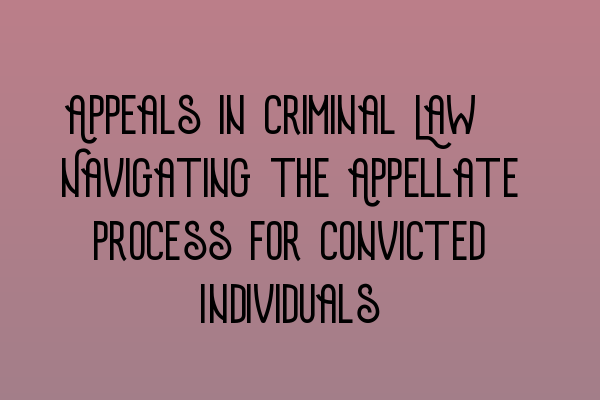Appeals in Criminal Law: Navigating the Appellate Process for Convicted Individuals
Being convicted of a criminal offense can have serious and long-lasting consequences. However, if you believe that an error occurred during your trial or that new evidence has emerged, you may be able to seek an appeal. The appellate process offers convicted individuals the opportunity to have their case reviewed by a higher court, potentially leading to a reversal of the conviction or a reduction in the severity of the sentence.
The Appeal Process
The appellate process is complex and intricate, and it requires a thorough understanding of criminal law and the specific rules and procedures governing appeals. As a convicted individual seeking an appeal, it is crucial to consult with a qualified solicitor who specializes in criminal law and has experience in handling appeals.
One of the first steps in the appeal process is filing a notice of appeal. This document informs the higher court that you wish to challenge your conviction or sentence. Your solicitor will work closely with you to gather the necessary information and evidence to support your appeal. This may include reviewing trial transcripts, analyzing the legal arguments made at trial, and identifying any errors or discrepancies that occurred during the proceedings.
Once the notice of appeal is filed, the appellate court will review the case based on the grounds mentioned in the appeal. These grounds could include errors of law or procedural irregularities that may have affected the outcome of the trial. It is important to note that an appeal cannot be based solely on the fact that you disagree with the verdict.
During the appellate process, your solicitor will present your case before the higher court, emphasizing the errors or irregularities that occurred during your trial. The court will then assess the validity of these claims and determine whether they warrant a reversal or reduction of the conviction or sentence.
It is important to understand that the success of an appeal depends on various factors, including the strength of the legal arguments presented, the quality of the evidence, and the expertise of the solicitor handling the case. Therefore, it is essential to choose a solicitor who has a proven track record in handling criminal appeals and who understands the intricacies of the appellate process.
The Importance of Legal Representation
Seeking an appeal in criminal law is a complex and challenging endeavor. It requires a thorough understanding of the law, extensive research, and the ability to navigate the legal system effectively. Without adequate legal representation, the chances of success in an appeal may be significantly diminished.
By hiring a qualified solicitor who specializes in criminal appeals, you can benefit from their knowledge and experience. A skilled solicitor will carefully analyze your case, identify potential grounds for appeal, and present compelling legal arguments on your behalf. They will also guide you throughout the entire process, ensuring that all necessary documents are filed correctly and that deadlines are met.
At SQE Criminal Law & Practice Law UK, our team of experienced solicitors is well-versed in the appellate process. We have successfully handled numerous appeals on behalf of our clients and have achieved positive outcomes in many cases.
If you have been convicted of a criminal offense and believe that you have grounds for appeal, we encourage you to contact our firm for a consultation. Our solicitors will assess the merits of your case and provide you with sound legal advice on the best course of action.
For more information about the SQE exams and preparation courses, you may find the following articles helpful:
- SQE 1 Practice Exam Questions
- SQE 1 Practice Mocks FLK1 FLK2
- SQE 2 Preparation Courses
- SQE 1 Preparation Courses
- SRA SQE Exam Dates
We look forward to assisting you with your appeal and ensuring that your rights are protected. Contact SQE Criminal Law & Practice Law UK today to schedule a consultation with one of our experienced solicitors.
